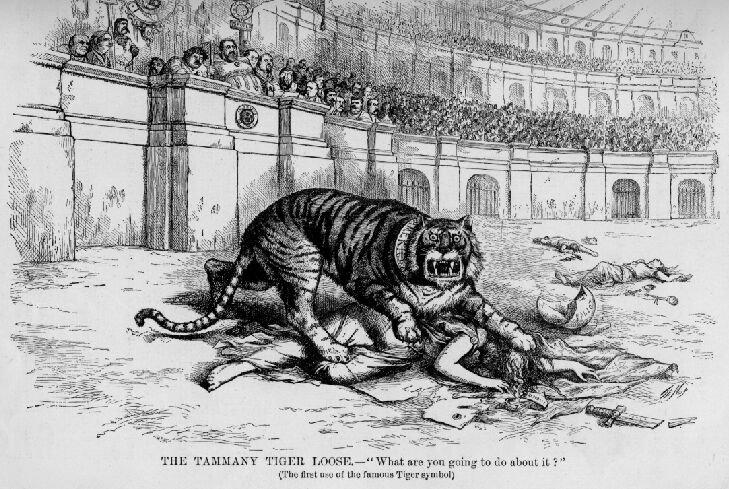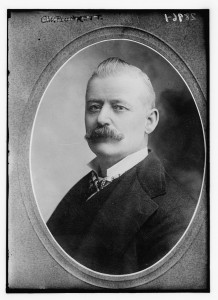 Thomas Nast/1871
Thomas Nast/1871
By Bob Hicks
The national political season is getting good and nasty these days, and we here at Art Scatter World Headquarters are pretty pumped about it: blood sports do that to us.
We’re especially excited about the literary possibilities. In recent days we’ve added some astute veteran political observers to our stable of correspondents, all of whom know their way around a well-turned phrase. First came Eugene Field, with his commentary on the viciousness of the infighting during the South Carolina primary campaign: “The truth about the cat and pup is this: they ate each other up!” Then we succeeded in persuading the Scottish poet William Miller, famed for breaking the Wee Willie Winkie scandal, to comment on Newt’s unusual nighttime frolics (“upstairs and downstairs in his nightgown”).
 Now we’re extremely proud to be able to bring you the commentary of the legendary George Washington Plunkitt, whose plainspoken eloquence on the subject of practical politics captivated the nation in the best-selling Plunkitt of Tammany Hall. Plunkitt made a fortune in the political game, boasting, among other things, “of his record in filling four public offices in one year and drawing salaries from three of them at the same time.”
Now we’re extremely proud to be able to bring you the commentary of the legendary George Washington Plunkitt, whose plainspoken eloquence on the subject of practical politics captivated the nation in the best-selling Plunkitt of Tammany Hall. Plunkitt made a fortune in the political game, boasting, among other things, “of his record in filling four public offices in one year and drawing salaries from three of them at the same time.”
Following is his first dispatch to Art Scatter. Don’t ask us what we had to guarantee Mr. Plunkitt to get him to write for us. You don’t want to know.
Plunkitt on the uproar over Newt and Fannie Mae:
“Everybody is talkin’ these days about Tammany men growin’ rich on graft, but nobody thinks of drawin’ the distinction between honest graft and dishonest graft. There’s all the difference in the world between the two. Yes, many of our men have grown rich in politics. I have myself. I’ve made a big fortune out of the game, and I’m gettin’ richer every day, but I’ve not gone in for dishonest graft – blackmailin’ gamblers, saloonkeepers, disorderly people, etc. – and neither has any of the men who have made big fortunes in politics.
“There’s an honest graft, and I’m an example of how it works. I might sum up the whole thing by sayin’: ‘I seen my opportunities and I took ’em.”
Plunkitt explains Mitt’s tax returns and the lobbying victories that allow him to pay a modest 15 percent tax rate on long-term capital gains and dividends:
“The books are always all right. The money in the city treasury is all right. Everything is all right. All they can show is that the Tammany heads of departments looked after their friends, within the law, and gave them what opportunities they could to make honest graft. Now, let me tell you that’s never goin’ to hurt Tammany with the people. Every good man looks after his friends, and any man who doesn’t isn’t likely to be popular. If I have a good thing to hand out in private life, I give it to a friend – Why shouldn’t I do the same in public life?”
Plunkitt on why so many of the 99 percent vote in the interests of the 1 percent:
“The Wall Street banker thinks it shameful to raise a department clerk’s salary from $1500 to $1800 a year, but every man who draws a salary himself says: ‘That’s all right. I wish it was me.’ And he feels very much like votin’ the Tammany ticket on election day, just out of sympathy.”
Plunkitt explains why Obama sounds as dry as Woodrow Wilson and Newt only plays around with history:
“Some young men think they can learn how to be successful in politics from books, and they cram their heads with all sorts of college rot. They couldn’t make a bigger mistake. Now, understand me I ain’t sayin’ nothin’ against colleges. I guess they’ll have to exist as long as there’s book-worms, and I suppose they do some good in a certain way, but they don’t count in politics. In fact, a young man who has gone through the college course is handicapped at the outset. He may succeed in politics, but the chances are 100 to 1 against him.”
Plunkitt explains why the debates are really nothing but a sideshow:
“Another mistake: some young men think that the best way to prepare for the political game is to practice speakin’ and becomin’ orators. That’s all wrong. We’ve got some orators in Tammany Hall, but they’re chiefly ornamental. … The men who rule have practiced keepin’ their tongues still, not exercisin’ them. So you want to drop the orator idea unless you mean to go into politics just to perform the skyrocket act.”
Plunkitt explains why civil service rules and public-employee unions are bad for the nation:
“This civil service law is the biggest fraud of the age. It is the curse of the nation. There can’t be no real patriotism while it lasts. How are you goin’ to interest our young men in their country if you have no offices to give them when they work for their party? Just look at things in this city today. There are ten thousand good offices, but we can’t get at more than a few hundred of them. How are we goin’ to provide for the thousands of men who worked for the Tammany ticket? It can’t be done. These men were full of patriotism a short time ago. They expected to be servin’ their city, but when we tell them that we can’t place them, do you think their patriotism is goin’ to last? Not much. They say: ‘What’s the use of workin’ for your country anyhow? There’s nothin’ in the game.’ And what can they do? I don’t know, but I’ll tell you what I do know. I know more than one young man in past years who worked for the ticket and was just overflowin’ with patriotism, but when he was knocked out by the civil service humbug he got to hate his country and became an Anarchist.”
Plunkitt explains why the Ron Pauls and Ralph Naders always lose:
“The fact is that a reformer can’t last in politics. He can make a show for a while, but he always comes down like a rocket. Politics is as much a regular business as the grocery or the dry-goods or the drug business. You’ve got to be trained up to it or you’re sure to fail. Suppose a man who knew nothing about the grocery trade suddenly went into the business and tried to conduct it according to his own ideas. Wouldn’t he make a mess of it? He might make a splurge for a while, as long as his money lasted, but his store would soon be empty. It’s just the same with a reformer. He hasn’t been brought up in the difficult business of politics and he makes a mess of it every time.”
Plunkitt explains what Obama must do to win again in 2012:
“There’s only one way to hold a district: you must study human nature and act accordin’. You can’t study human nature in books. Books is a hindrance more than anything else. If you have been to college, so much the worse for you. You’ll have to unlearn all you learned before you can get right down to human nature, and unlearnin’ takes a lot of time. Some men can never forget what they learned at college. Such men may get to be district leaders by a fluke, but they never last.
“To learn real human nature you have to go among the people, see them and be seen. … I know every man, woman, and child in the Fifteenth District, except them that’s been born this summer – and I know some of them, too. I know what they like and what they don’t like, what they are strong at and what they are weak in, and I reach them by approachin’ at the right side.”
*
ILLUSTRATIONS, from top:
- Thomas Nast. “The Tammany Tiger Loose: ‘What are you going to do about it?’,” published in Harper’s Weekly in November 1871, just before election day. Wikimedia Commons.
- George Washington Plunkitt, ca. 1915. Wikimedia Commons.